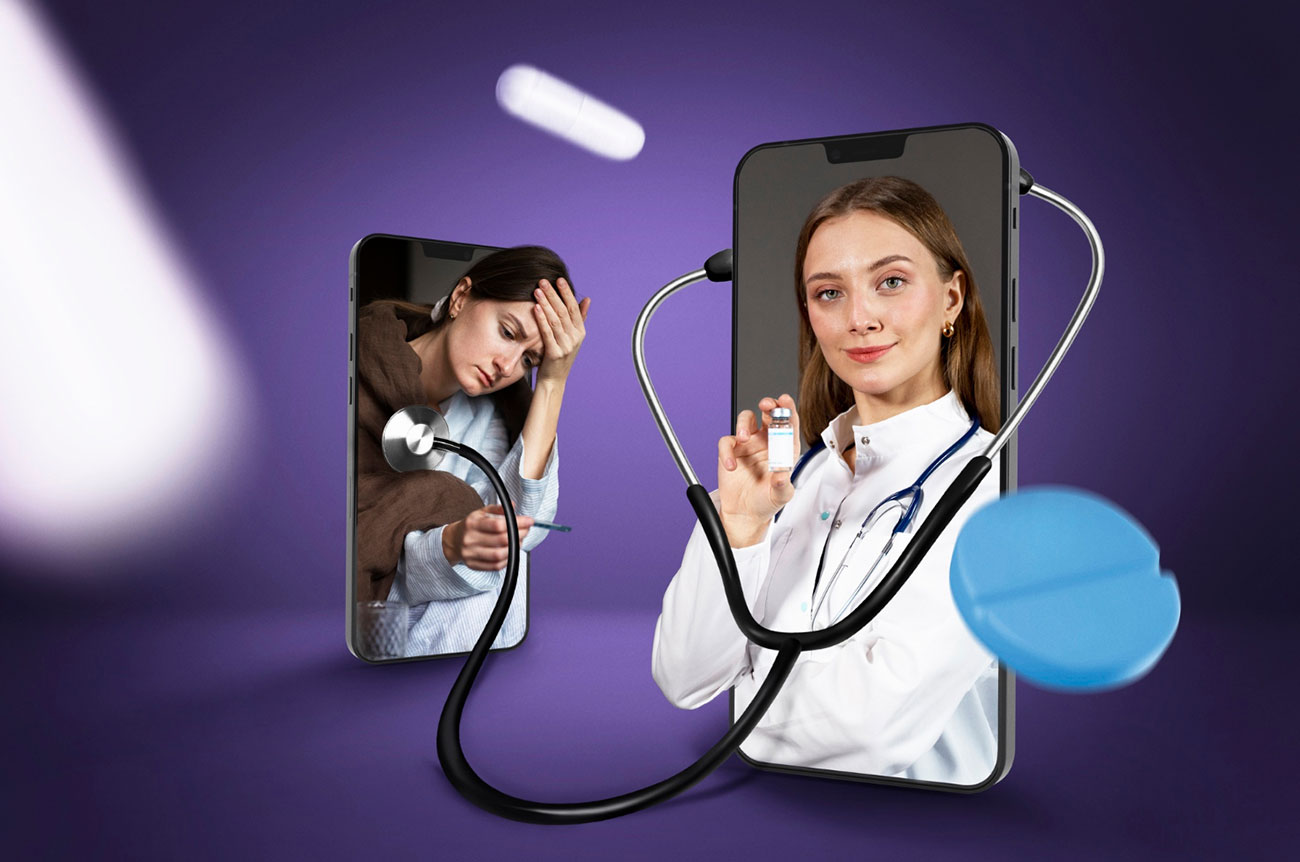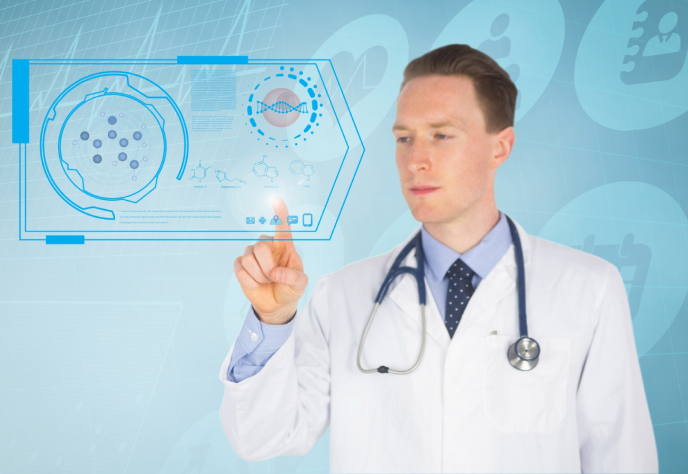
User-Centered Design
Healthcare applications are used by different people such as patients, physicians, and caregivers as well. A simple to operate screen enables the various users to access the application without any difficulties irrespective of their skills in using technology.
Thumb Friendly Layout
Make sure to create thumb-friendly UI by placing critical buttons where they can easily be touched by the thumb of a user for an enjoyable single-handed experience.
Accessibility and Fast load times
A good user interface and user experience (UI/UX) design make the application available for all people, even those who cannot see or hear thus making it adhere to accessibility regulations (for instance WCAG). Optimize images and background processes for fast loading.
Trust and Credibility
In our quest for knowledge, we come across the issue of creating a website with a good reputation on the internet. The professionalism and intuitiveness of the design instils confidence in users. An app that appears and works dependable creates confidence among its users.
Efficiency
Simple navigation system with clear menus should be used, minimalism observed in design so that people will find buttons easier to press on their mobile devices. Users can navigate screens better if they understand what has been done, this is why swipe or tap actions must always make sense and information that is kept in order help the user very accurately locate what he or she wants to read, even though there is no data in the same one. These factors of healthcare are significant since medical knowledge can make a difference between life and death.
Battery, Data Usage Efficiency & Error Reduction
App should be designed in a way so that it will be energy-efficient, with minimal drain on the phone’s battery, and reduce unnecessary data usage by optimizing background processes. User-friendly design lowers the chance of mistakes, which plays a key role in healthcare where errors can lead to grave outcomes
User Engagement and Retention
An effective UI/UX design holds users’ attention and motivates them to keep using the app. This has a positive impact on how well patients stick to their treatment plans and their overall health results.
Personalization
Well-designed UI/UX has an impact on creating custom experiences, like personalized dashboards or tailored content, which boosts how happy users are.
Data Security Awareness
Using a proper designed application, users can be taught about safety characteristics that can make them feel safe to enter some personal health details.
Compliance with Regulations
With a good design of the UI/UX all the necessary industry rules like HIPAA would be adhered to thus guiding the users in handling their data in a safe manner.
These things help in providing an effective & user-friendly experience of health care apps which is designed particularly for the needs of the mobile users.
smartData is a leading provider of healthcare software, delivering customized solutions to enhance patient care. We provide digital health tools, IoT integration, and AI/ML technologies to enhance care and efficiency. We are developing applications like healthcare revenue cycle management and ensuring compliance with healthcare regulations such as HIPAA, HITECH, HL-7, and GDPR across Primary, Behavioral, Dental, and Chronic Care services.
At smartData, we prioritize scalability and performance in healthcare applications for new development, upgrades, and maintenance of legacy system. This ensures smooth handling of growing patient data, more users, and new features without delays, helping our healthcare partners to keep up with growth and deliver quality care.
Key factors we consider for scalability and performance of any healthcare application:
- Data storage and retrieval: As patient data increases, the Healthcare system needs enough storage to handle the growth. The system should retrieve data quickly, ensuring real-time access.
- Any application must provide fast and reliable access to patient information.
- Hardware and software limitations and a strong network infrastructure is also important to support more users.
- Other factors like workflows, resource management, and data governance also impact Healthcare System scalability. Healthcare organizations need efficient processes, proper resource allocation, and clear data policies to handle growth and maintain data quality and privacy.
Challenges:
- Resistance to Change: Any Healthcare organizations often hesitate to adopt new technologies or processes.
- Legacy System Integration: Health Information Systems need to work well with existing systems and processes.
- Interoperability Issues: Different healthcare organizations often don’t use the same communication standards, which creates problems. This lack of interoperability makes it difficult for insurers, providers, and regulators to share information smoothly.
- Security Concerns: Because healthcare data is sensitive, keeping it secure is very important. As systems grow and become more scalable, it becomes harder to maintain strong cybersecurity, increasing the risk of data breaches and unauthorized access.

We follow below Key strategies to optimize scalability and performance:
-
Cloud Infrastructure:
Utilize cloud services (AWS/Azure/Google cloud) to dynamically scale resources based on demand, ensuring that applications can handle varying workloads without performance degradation. We can also use cloud-based solutions such as Azure/AWS data lakes or data warehouses, to store and process your data in a scalable and cost-effective way for easy access to computing resources and scalable data storage.
-
Microservices based architecture :
We can create modular and flexible systems that can be easily changed to meet new needs. For instance, we should use microservices, which are small, independent, and reusable units that connect through APIs. Microservices can help improve the scalability, reliability, security, and interoperability of your healthcare system.
-
Caching:
We can use caching to keep frequently accessed data in memory. This helps reduce delays and speeds up response times for users.
-
Intelligent Data Processing with AI:
Also we can use artificial intelligence (AI) in data processing can greatly improve how quickly and efficiently large amounts of data are handled. Machine learning algorithms can identify patterns, making data retrieval and processing faster for better decision-making.
-
Interoperability:
Support interoperability and standardization to allow the healthcare application to exchange data smoothly with other systems. Blockchain technology offers a secure and decentralized way to enable data sharing among healthcare insurance systems. It allows for seamless, transparent, and tamper-proof data exchange between different parties.
-
Robust Cybersecurity Strategies:
We should focus on strong cybersecurity, including encryption, multi-factor authentication, and real-time threat monitoring. AI-based solutions can help detect and address potential security threats early.
-
Network Segmentation and Optimization:
We should divide the network into smaller zones it help us to improves security and performance by reducing the impact of potential disruptions. An optimized network setup and smart bandwidth use ensure faster data flow and lower delays, which are essential for real-time telehealth and patient monitoring.
-
Leverage Virtualization and Containerization:
These technologies help to use hardware resources more efficiently, reducing costs and increasing scalability. They allow multiple applications to run on fewer physical servers, improve resource use and improving performance.
-
Monitoring and Analytics:
Continuous monitoring helps identify problems and optimize system settings. This proactive approach ensures high performance and minimal disruption to essential healthcare services.
-
Efficient Resource Management:
Regularly analyse resource usage and adjust configurations to optimize performance, ensuring that resources are allocated effectively to meet demand.
-
Compliance with Standards:
Ensure applications adhere to industry standards and regulations, which can help data handling and security, further enhancing performance.
In conclusion, scalability is essential for the success of any healthcare application. Each organization need to address scalability issues and adopt strategies to handle growth and changes. By using modular systems, cloud solutions, load balancing, interoperability, automation, and artificial intelligence, we can create healthcare information that improve performance, user satisfaction, data quality, security, and reduce costs. By integrating these strategies, healthcare applications can achieve improved scalability and performance, ultimately leading to better patient care and operational efficiency.
Patient data privacy is a critical aspect of healthcare industry, ensuring that sensitive information remains secure and confidential. To achieve this, our #healthcare team continuously strives and ensures below parameters are taken care, for every single project
Here are some key points highlighting its importance:
-
Trust and Confidentiality:
Maintaining patient data privacy helps build trust between patients and healthcare providers. When patients are confident that their personal information is secure, they are more likely to share accurate and complete health details, which is essential for effective diagnosis and treatment.
-
Protection Against Unauthorized Access:
Healthcare systems implements robust security measures to prevent unauthorized access, breaches, or misuse of patient data. This includes using encryption, access controls, and regular cyber security audits to safeguard information.
-
Compliance with Regulations:
Healthcare systems must comply with various data privacy regulations, such as HIPAA in the United States, GDPR in UK, which mandate strict data protection measures. Compliance ensures that healthcare system follow best practices in data security and privacy.
-
Prevention of Harm:
Unauthorized disclosure or mishandling of patient data can lead to severe consequences, including identity theft, discrimination, and financial loss. Protecting patient data helps prevent these potential harms and ensures that patients receive the appropriate level of care without fear of their information being compromised.
-
Enhancing Healthcare Research:
While healthcare research often involves the use of patient data, it is crucial to anonymize and protect this information to prevent re-identification. Ensuring data privacy in research helps maintain ethical standards and protects individuals’ rights.
-
Promoting Patient-Centered Care:
By prioritizing data privacy, healthcare providers can create a safe environment that promotes patient-centered care. Patients are more likely to engage in their healthcare journey when they feel their privacy is respected.
In summary, patient data privacy is essential for maintaining trust, ensuring compliance with regulations, preventing harm, and promoting care. Healthcare applications must continuously improve their data protection measures to keep up with evolving threats and maintain the highest standards of privacy and security.
We at @smartData Enterprises emphasises while developing the applications for our healthcare #customers which gives confidence to them, that data is not breached or compromised and hence #HIPAA compliances are strictly compiled
Right from the streamlining of operations and productivity boosts to innovation across industries, enterprise solutions have empowered business to grow sustainably. Leveraging cutting-edge technology, smartData’s solution empowers businesses to transform their industries and achieve sustainable growth.
Benefits of Enterprise Software Key
-
Streamline Operations:
by automating routine tasks, helps decreasing manual errors, and improve workflows.
-
Improved Productivity:
Helps business to increase efficiency, plan and increase production, and cut costs by removing gaps.
-
Innovation and Growth:
Helps in defining innovative solutions, utilizing AI and data analytical solutions to build competitive products that helps in targeting the specific audience for sustainable success.
Case Studies:
Here are some of the key case studies from supply chain management to workforce solutions. Following smartData solutions based case studies show how thoughtful enterprise software solutions could make a difference in the industries and move towards sustainable growth.

-
Supply Chain Optimization:
Supply chain management in today’s global market can be quite tough to handle. An example of this change would be a smartData project where it designed a solution to a huge branding business operating across many geographies: countries. This is a comprehensive system that cuts across several industries to provide a holistic approach to operational integration, cost-cutting, and customer satisfaction. The business has been able to cut costs and increase operational efficiency through proper management of global sourcing and ensuring quality goods, optimum inventory, and efficient logistics.
The advanced CRM capabilities allow businesses to maintain strong relationships with their customers and market products that meet specific needs, making the customers satisfied and loyal. Data-driven insights provided by the system help businesses make informed decisions and optimize their operations for a competitive advantage. This further goes with the fact that integration of it into the existing systems along with adaptability to the changed business requirements create long-term value.
-
Workflow and Workforce Management:
rkforce optimization is another domain where smartData has made its mark by delivering advanced solutions covering both standard data driven and advanced AI driven solutions. For instance, a company having workforce management requirement partnered with smartData to craft a solution which utilizes AI and machine learning. This comprehensive platform is tailored specifically to the construction and mining industries, helping businesses use assets most efficiently while reducing costs by automatically managing a workforce and workflow. The platform manages inspection assignments, staff performances, and training programs to make employees adequately ready to do their jobs, as well as automating routine inspection work, optimizing the maintenance schedule based on asset condition, and providing reports that transform data into in-depth decisions. Together, all these new features enhance operational efficiency, reduce costs, maximize asset usage, and improve decision-making capabilities.
-
Digital Commerce Innovation:
In the digital commerce space which is fast passed and time sensitive, businesses have to ‘must’ stay agile to meet the emergent needs of customers. Armed with its expertise in developing tailor-made AI-driven eCommerce solutions, the company has seen firms enhance their digital presence, engage their customers better, and convert sales. One such project, which smartData did was to design an all-comprehensive platform tailored for businesses selling online across multiple marketplaces to help businesses optimize their digital presence, enhanced customer engagement, and sales conversion generation.
The platform streamlines multi-channel e-commerce operations by effectively managing inventory, orders, product listings, shipping, as well as valuable analytics, saving time and cost. Its easy-to-use interface and hassle-free integration with numerous business applications make it suitable for businesses of all sizes. Whether Amazon, eBay, Etsy, Shopify, or any other ecommerce marketplace, this platform helps optimize the online presence, enhances customer satisfaction, and brings growth into the ever-competitive world of ecommerce.
-
AI-Based Business Automation:
AI has transformed industries from all quarters, automating mundane tasks and improving efficiency. smartData has developed, built, and applied AI solutions in automating different tasks ranging from customer services to data processing. A good example is the implementation of artificial intelligence in electronic health records systems. Automated patient intake, scheduling, and report generation reduce administrative workload in the healthcare operations, thus saving a greater and sufficient amount of time for professionals to concentrate on higher-quality provision and strengthen such an outcome. It allows bringing efficiency, fewer errors, data-driven insights, and improvements in the experience of patients. Businesses can use AI to make their processes, workflow, and overall efficiency of the business better with a greater margin of profit.
Conclusion
Enterprise software solutions that meet specific business requirements and needs are not optional but important for businesses. smartData case studies offer a reflection of how these technologies can be leveraged.
Whether one is talking about supply chain optimization, workforce management, e-commerce, or AI-driven automation, companies embracing those technologies are best set to grow and thrive.
Healthcare IT consulting firms specialize in advising medical practices on how to leverage technology to improve their operations. They provide expertise in various IT solutions, from electronic health records (EHR) systems to telemedicine platforms. By partnering with these experts, your practice gains access to valuable insights and guidance tailored to the unique challenges of the healthcare industry.
Enhanced Operational Efficiency Through Technology
One of the primary benefits of working with a healthcare IT consulting firm is the improvement in operational efficiency. These consultants help streamline workflows by integrating advanced technology solutions that automate routine tasks, reduce paperwork, and minimize errors. This leads to a more organized practice where staff can focus more on patient care rather than administrative duties.
Improved Patient Care and Experience
Consulting firms play a crucial role in enhancing patient care and experience. By implementing user-friendly EHR systems and other digital tools, they ensure that patient information is easily accessible and accurately recorded. This results in faster and more accurate diagnoses, better coordination of care, and a more personalized patient experience, ultimately leading to higher satisfaction and better health outcomes.
Streamlined Compliance and Regulatory Management
Navigating healthcare regulations can be complex and time-consuming. Healthcare IT consultants help practices stay compliant with industry standards and regulations by implementing systems that ensure proper documentation and reporting. They assist in managing data security, privacy concerns, and other compliance issues, reducing the risk of costly penalties and legal challenges.
Cost Savings and Resource Optimization
Partnering with a healthcare IT consulting firm can lead to significant cost savings. By optimizing technology investments and improving operational efficiencies, practices can reduce overhead costs and avoid unnecessary expenditures. Additionally, these consultants can help identify areas where resources can be better allocated, leading to more effective use of funds and improved financial health for the practice.

Access to Specialized Expertise and Knowledge
Partnering with a healthcare IT consulting firm gives your practice access to a team of experts with deep knowledge in healthcare technology and IT systems. These professionals stay up-to-date with the latest advancements and regulations, ensuring that your practice benefits from the most current and effective solutions. Their specialized skills can help you navigate complex IT challenges and make informed decisions that align with your practice’s goals.
Tailored IT Solutions for Unique Practice Needs
Every healthcare practice has unique needs and challenges. A consulting firm can provide customized IT solutions that fit your specific requirements. Whether it’s implementing a new electronic health record (EHR) system or optimizing existing IT infrastructure, these solutions are designed to enhance efficiency and support the specific workflows of your practice. Tailored solutions ensure that you get the most value out of your technology investments.
Implementation of Cutting-Edge Technologies
Healthcare IT consulting firms are well-versed in the latest technologies that can revolutionize your practice. From advanced data analytics to telemedicine platforms, these firms help you integrate cutting-edge technologies that improve patient care and operational efficiency. By leveraging these innovations, your practice can stay competitive and provide high-quality care that meets modern standards.
Data Security and Risk Management
Protecting patient data is crucial in healthcare, and a consulting firm can help safeguard your practice against data breaches and security threats. They implement robust security measures and risk management strategies to ensure that sensitive information remains confidential and secure. By partnering with experts, you can mitigate risks and comply with regulatory requirements, giving you peace of mind.
Ongoing Support and Maintenance Services
Technology requires regular maintenance and support to function optimally. A healthcare IT consulting firm offers ongoing support services to address any issues that may arise. This proactive approach ensures that your IT systems remain operational and up-to-date, minimizing downtime and disruptions. With reliable support, your practice can focus on delivering excellent patient care without worrying about technical issues.
Conclusion
Partnering with a healthcare consulting firm provides numerous benefits, from specialized expertise and strong data security. By leveraging these advantages, your practice can enhance its efficiency, improve patient care, and stay ahead in the rapidly evolving healthcare landscape. For more information on how healthcare IT consulting can benefit your practice, visit Smart Data Inc..
With machine’s capabilities to precisely interpret the visual information, computer vision has opened a lot many potential opportunities by improving diagnosis, treatment, and patient care.
Some of the potential use-cases where computer vision can be highly utilized are defined below:
- A key application in healthcare is the analysis of medical images. Algorithms powered by computer vision can evaluate images like X-rays, MRIs, and CT scans, identifying abnormalities that might be overlooked by human observation. This enables earlier detection and more effective treatment of conditions like cancer and heart disease.
- It can also be used to develop wearable devices that can monitor patients’ vital signs and detect changes that may indicate a health problem. This can enable earlier intervention and prevent serious health complications.
- As another use-case, it is also getting used to reduce the risk of complications and improve patient outcomes during the surgical operations. Here computer vision is leveraged to guide robots in performing delicate surgical procedures with greater precision and accuracy than is possible with traditional methods.
- In addition, computer vision is being used for patient monitoring also where the AI-powered cameras can track patients’ movements, alerting medical staff to falls or irregularities in patient behavior, especially in elderly care. AI models hence developed take real-time CCTV feed to monitor the patients.

As a conclusion we can consider computer vision to be potential candidate which can transform healthcare by improving diagnosis, treatment, and patient care.
Revenue Cycle Management includes everything from verifying patient insurance to billing and collecting payments. Proper RCM ensures that healthcare providers are compensated fairly and promptly for their services.
The Role of IT Services in Enhancing RCM Efficiency
Healthcare IT services play a vital role in streamlining RCM by implementing systems and technologies that automate and simplify financial processes. These IT solutions reduce manual errors, speed up billing cycles, and enhance the overall efficiency of revenue management. By integrating technology into RCM, providers can achieve better financial outcomes and improve their operational workflow.
Key Challenges in Revenue Cycle Management
RCM faces several challenges, including complex billing codes, frequent claim denials, and difficulties in tracking payments. These issues can lead to delays and revenue losses. Healthcare IT services help address these challenges by providing tools and support to handle complex billing requirements and reduce errors in claims processing.
How Healthcare IT Services Can Streamline Billing Processes
IT services optimise billing processes through automation and electronic data exchange. By using advanced software, healthcare providers can automatically generate and submit claims, track payment status, and manage patient accounts more effectively. This automation reduces the administrative burden and accelerates the revenue cycle.
Implementing Advanced Software Solutions for RCM
Advanced software solutions for RCM include integrated systems that connect various aspects of the revenue cycle, such as patient registration, claims processing, and payment reconciliation. These solutions offer real-time data access, reporting capabilities, and predictive analytics, allowing healthcare providers to make informed decisions and improve financial performance.
Optimizing Claims Processing with IT Innovations
Healthcare IT services enhance claims processing by integrating advanced software solutions that automate data entry, streamline claim submission, and reduce errors. Innovations like electronic claim management systems and real-time claim tracking ensure quicker and more accurate processing, minimising delays and rejections.
The Impact of Automation on Revenue Cycle Accuracy
Automation plays a crucial role in improving the accuracy of revenue cycle management. Automated systems reduce manual errors by handling repetitive tasks such as coding and billing. This leads to more precise claims and faster reimbursement, ultimately enhancing financial performance and operational efficiency.
Data Security and Compliance in RCM Solutions
Ensuring data security and compliance is vital in RCM solutions. IT services providers implement robust security measures, such as encryption and access controls, to protect sensitive patient information. Compliance with regulations like HIPAA is maintained through regular audits and updates to safeguard against breaches and legal issues.

Integrating EHR Systems with Revenue Cycle Management
Integration of Electronic Health Records (EHR) systems with RCM solutions is key to seamless revenue cycle operations. By linking EHRs with billing systems, healthcare providers can access comprehensive patient information, streamline billing processes, and improve the accuracy of claims submissions, resulting in more efficient revenue cycles.
Analytics and Reporting Tools for Better RCM Outcomes
Analytics and reporting tools provide valuable insights into revenue cycle performance. By leveraging data analytics, healthcare IT services can identify trends, monitor key metrics, and uncover areas for improvement. These insights help in making informed decisions, optimising processes, and ultimately enhancing the overall effectiveness of RCM solutions.
Reducing Denials and Rejections through IT Solutions
One of the primary ways healthcare IT services providers optimize Revenue Cycle Management (RCM) solutions is by reducing claim denials and rejections. By leveraging advanced IT systems, healthcare providers can ensure that claims are submitted correctly the first time. This involves using intelligent data validation tools that check for errors before claims are sent to insurers. Additionally, IT solutions can track common denial reasons and provide insights into how to avoid them in the future. This proactive approach helps streamline the process, ensuring more claims are paid on time and reducing the administrative burden associated with managing denials.
Future Trends in RCM and Healthcare IT Integration
Looking ahead, several trends are shaping the future of Revenue Cycle Management and its integration with healthcare IT. One significant trend is the growing use of artificial intelligence (AI) and machine learning to predict and prevent revenue cycle issues before they arise. These technologies can analyze vast amounts of data to identify patterns and potential problems, allowing for more informed decision-making. Additionally, there is a push towards more integrated systems that connect various aspects of healthcare IT, from electronic health records (EHR) to billing and coding systems. This integration enhances overall efficiency and accuracy, providing a seamless experience for both healthcare providers and patients.
Conclusion
In summary, healthcare IT services providers play a crucial role in optimizing Revenue Cycle Management by addressing key challenges such as claim denials and integrating advanced technologies. By employing data validation tools, AI, and integrated systems, they enhance the efficiency and accuracy of RCM solutions. As these technologies continue to evolve, they promise even greater improvements in managing the revenue cycle, ultimately benefiting both healthcare providers and patients. For more information on optimizing your RCM solutions, visit SmartData Inc..
These models have been used in forecasting the prices of real estate based on the location, area, neighbourhoods, important landmarks and market conditions. At smartData, we use predictive analysis to enable clients to locate their ideal property by harnessing the power of machine learning models. We grade the locations based on the amenities available, historical price trends, and other factors so that our clients can make a knowledgeable decision about possible investments. Our models scale down for the clients the otherwise cumbersome process of searching for property and reduce time and effort in the quest for a high-value opportunity. With the help of smartData capabilities, the clients develop their competitive advantage in the real estate marketplace by assuring them of the very best properties that best suit their preferences and financial goals.

At smartData, we extend predictive analysis capabilities to the real estate market, helping clients efficiently locate ideal properties by leveraging machine learning models. These models assess key factors such as location, historical price trends, neighborhood amenities, and market conditions. By grading locations and streamlining the property search process, we enable clients to make informed investment decisions quickly. This process not only reduces time and effort but also provides clients with a competitive edge, ensuring they secure high-value real estate opportunities that align with their financial goals and preferences.
Predictive analytics is transforming healthcare, and smartData is at the forefront of this change. By leveraging vast datasets, such as patient medical histories, genetic profiles, and environmental factors, smartData’s advanced solutions can help predict disease risks. This allows healthcare providers to intervene earlier with tailored treatments and preventive care plans. With these innovations, smartData supports the healthcare industry in improving patient outcomes, reducing hospital readmissions, and enhancing overall efficiency in care delivery. Through cutting-edge predictive models, smartData is enabling smarter, data-driven healthcare solutions.
Disease Prediction and Early Intervention
One of the most impactful applications of predictive analytics in healthcare is disease prediction. By analyzing vast amounts of patient data, including medical history, genetic profiles, wound assessment data, and environmental factors, predictive models can identify individuals at high risk for specific conditions. This enables healthcare providers to intervene early with preventive measures and tailored treatment plans, potentially saving lives and reducing hospital readmissions.

Wound Assessment and Predictive Care
Wound management is another area where predictive analytics can be a game changer. By utilizing AI-driven wound assessment tools, healthcare providers can monitor healing progress in real-time, predict complications such as infections, and optimize treatment. Advanced wound care models can analyze factors like wound size, depth, patient health conditions, and tissue response to recommend personalized interventions. This reduces healing time, minimizes complications, and improves patient outcomes, particularly for chronic wound patients.
Personalized Treatment Plans
Beyond disease and wound prediction, predictive analytics plays a crucial role in personalized care. Data-driven models analyze historical patient data to identify patterns that help healthcare professionals make more informed decisions about treatments. These models can suggest the most effective therapies, medications, and lifestyle changes, ensuring that each patient receives care tailored to their unique health profile. This approach fosters patient engagement, improves compliance, and enhances overall health outcomes.
Operational Efficiency in Healthcare
Predictive analytics also addresses operational challenges like care gap analysis, pharmacy stock prediction, and hospital resource management. By forecasting patient demand and predicting resource utilization, healthcare organizations can optimize staffing levels, manage supply chains, and allocate medical resources more effectively. For example, by analyzing patient data, hospitals can predict peak times for admissions, ensuring that staffing and supplies are aligned to meet demand, ultimately enhancing the quality of care and reducing costs.
Improving Healthcare Outcomes with Data
As the healthcare industry grapples with issues like staff shortages, rising costs, and an aging population, the power of predictive analytics is more relevant than ever. Wound care, disease prevention, personalized treatment, and operational improvements all benefit from this data-driven approach. By leveraging advanced algorithms and machine learning, healthcare providers can make better-informed decisions, improve patient outcomes, and ensure long-term sustainability.
At smartData, we specialize in helping healthcare organizations implement predictive analytics to address these critical use cases. Whether you are looking to enhance disease prediction, improve wound assessment, or optimize operational efficiency, our expertise can guide you through the process.
Let us partner with you to harness the power of data and drive transformative change in your healthcare services.
We are helping organizations to support the move to value-based care, reimagine the public healthcare infrastructure, leverage technology to improve access, shift more hospital care into the home, cut the red tape, and keep patients engaged.
Our journey in digital health is driven by the mission to build a healthcare ecosystem that is personalized, efficient, and accessible to all globally. Our solutions aim to enhance patient care and empower individuals through innovative approaches.
Our commitment to healthcare is evident through these implementations :-
Telehealth & Virtual Care platforms
- These platforms bridge the gap between patients and healthcare professionals, offering a seamless, convenient, and accessible means of accessing medical expertise. Our solutions empower patients to connect with doctors, nurses, and specialists from anywhere, eliminating geographical barriers and making healthcare more efficient.
- We also prioritize Health & Wellness apps, which play a crucial role in promoting overall well-being. These apps provide a holistic approach to health, focusing not only on medical care but also on wellness and fitness.
User centric
- Applications designed for accessibility, making it effortless for individuals to monitor vital signs, manage medications, and access health-related information.
- In today’s interconnected world, smartData is seamlessly integrating a spectrum of IoT and medical devices. Our dedication to this cutting-edge approach ensures the smooth real-time flow of data and interoperability across a wide range of devices, including wearable health trackers, connected medical instruments, and intricate hospital machinery.
- At smartData we are commitment to enhancing patient care through advanced monitoring, precise care delivery, and improved health outcomes. By harnessing the power of IoT and integrating an array of medical devices, we empower healthcare providers to monitor their patients more effectively, deliver care with unparalleled precision, and ultimately drive better health results.
AI
- AI is transforming healthcare by reshaping clinical workflows and enhancing the roles of clinicians and medical staff. By automating repetitive tasks, AI allows physicians to focus more on personalized patient care, improving both efficiency and outcomes. Key applications of AI and machine learning in healthcare include Predictive Analytics, Personalised Medicine, Virtual Health Assistants,Medical Transcribing, Medical Imaging and Diagnostics.
- Our knowledge spans a wide array of regulatory standards, including HIPAA, CCDA, HL7, FHIR, PIPEDA, SNOMED, and many more.

What sets smartData apart is our commitment to going beyond mere standard adherence
